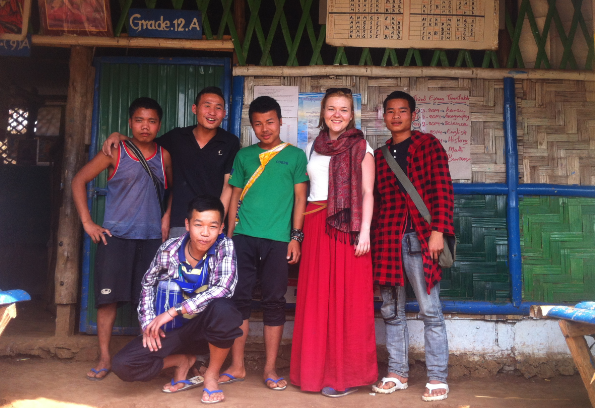Published: 15 August 2014
Region: South East Asia
By Magdalena Bukacka*

 Imagine that you are born in a place with no radio, no television and no newspapers. You are a castaway of the twenty-first century.
Imagine that you are born in a place with no radio, no television and no newspapers. You are a castaway of the twenty-first century.
At the Burma-Thailand border there are nine refugee camps. I am visiting two of them: Umpiem Mai and Nu Po. Getting to these places is much easier, and sometimes even only possible, during the dry season. It is still a long journey; travelling in pick-up trucks via long winding roads, with sharp turns. The camps have specific opening hours; visitors are only allowed in until 5 p.m.
The refugee camp looks a little like a kindergarten. There are kids are everywhere! They are happy, smiling, and cheerful, even though they are wearing no shoes and dirty clothes. Yet, their parents are not as happy as them. “Most of the time I am unhappy. It is only rarely, extremely rarely, that I am happy,” says a former soldier.
What does everyday life looks like here? Each day at the camp is the same and this is problematic. Boredom, lack of jobs and also a lack of perspective for a brighter future are pushing people to become depressed and overwhelmed. Just within the last year, five refugees committed suicide. Some of them have problems with alcoholism and drug abuse. Yet, in the camp there are medical and psychological institutions offering help.
Refugees receive food baskets from different NGOs. A few months ago, rations were decreased. This now means that each person is getting less. The lack of food also contributes to the issues faced by the Burmese refugees.
I spoke with some teenage girls. More than 20 years ago, their parents escaped from their homeland to come to Thailand. The refugee camp is the only reality they know. “When I grow up, I want to be a nurse. I want to help soldiers” says one. “I want to be a teacher and return to Burma to teach kids” says another.
Schools at the camp are magical places, where kids can be simply kids. Although there are often more than 70 pupils in one class, they are gaining a good education. At the school that I am visiting, kids are studying seven different subjects, including mathematics, the Burmese language and the ethnic Karen language.
“Living in Burma is really unsafe. It is much better to be here, at the camp.” a man in his early thirties, wearing the traditional pink costume, told me. Each of the Burmese refugees escaped looking for a better life. “To get to the camp, I had to walk 600 km, across the jungle and mountains,” says another man, wearing a black T-Shirt with a map of Burma printed on it.
The heaven each refugee is seeking encompasses dignity, peace and, simply, food. Until the bloodbath in Burma stops, these people will be the castaways of our times.
*Magdalena Bukacka is a Polish journalist, who was trained by MDI at various workshops and events.